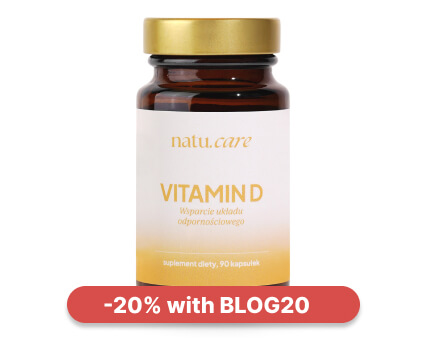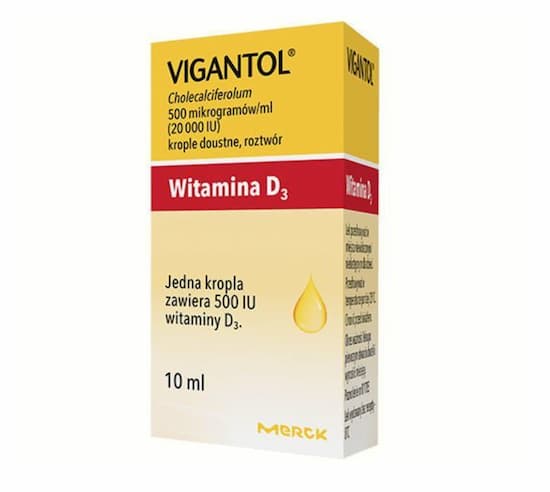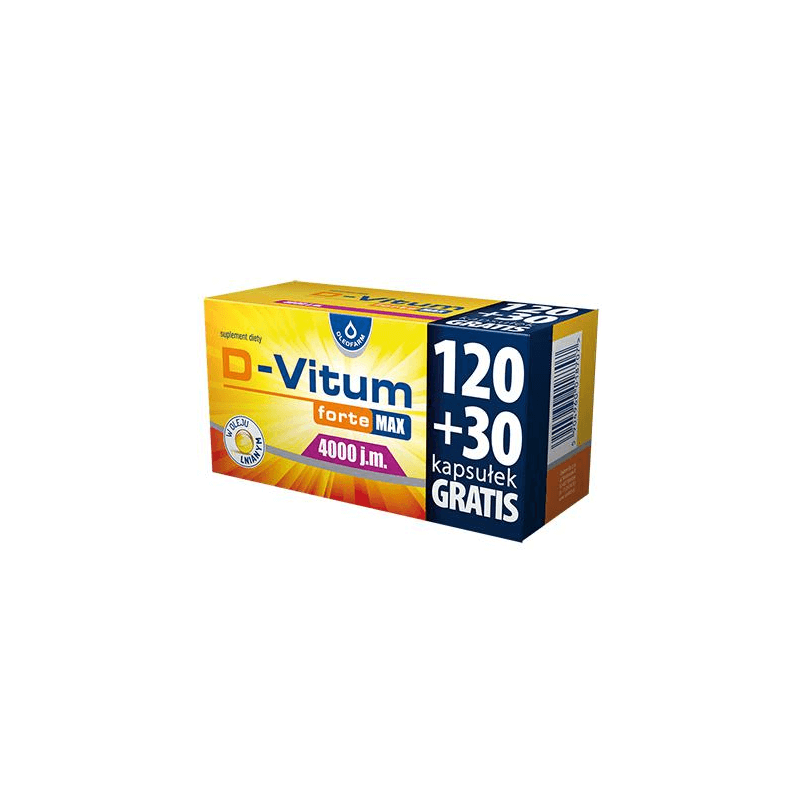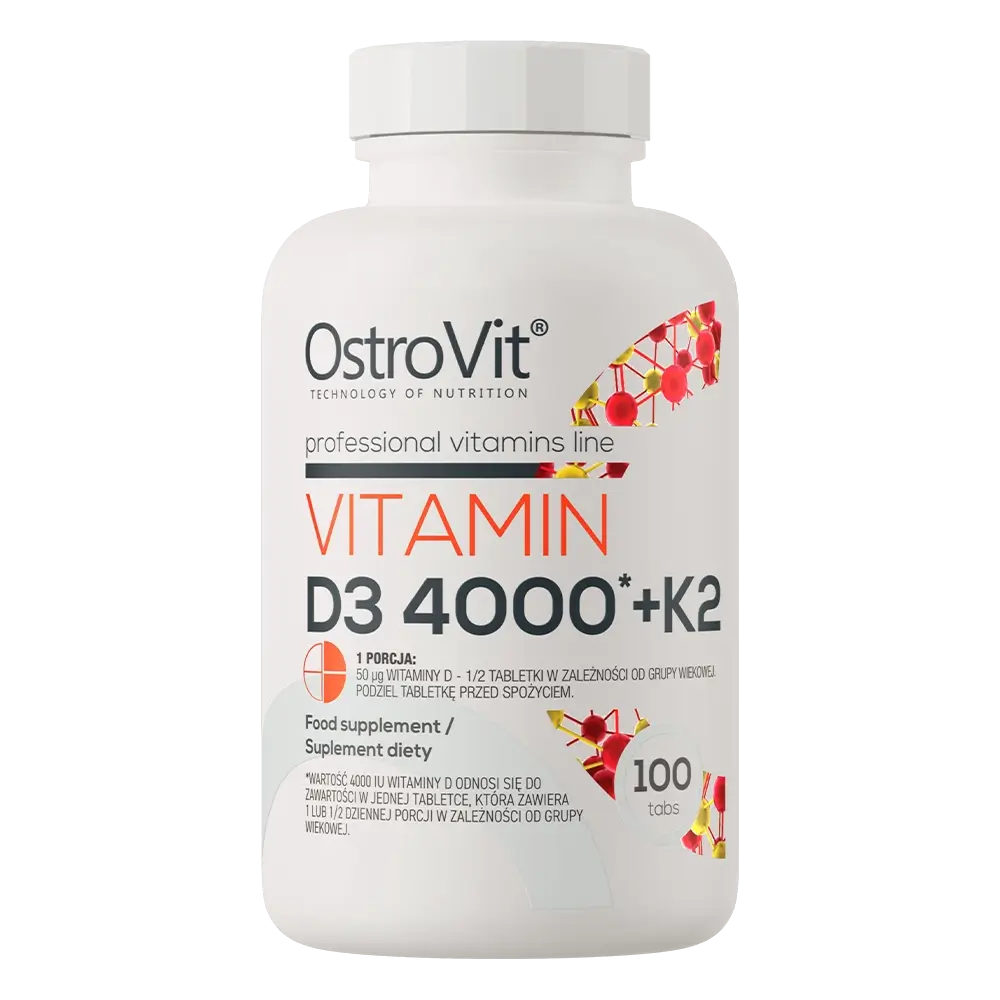What is vitamin D in? The three most important sources of vitamin D
Vitamin D is special! Find out where to get it from to ensure its correct concentration.


Learn more about our editorial process
.

Learn more about our editorial process
.

Learn more about our editorial process
.

Learn more about our editorial process
.
Why you can trust us
Articles on Natu.Care are written based on scientific research, data from government websites and other reliable sources. The texts are written in cooperation with doctors, nutritionists and other health and beauty experts. Articles are reviewed before publication and during significant updates.
.Learn more about our editorial process
.Information about advertisements
Content on Natu.Care may contain links to products from the sale of which we may receive a commission. When creating content, we adhere to high editorial standards and take care to be objective about the products discussed. The presence of affiliate links is not dictated by our partners, and we select the products we review ourselves completely independently.
.Learn more about our terms and Conditions
.Vitamin D is a unique vitamin - it is produced in the skin during exposure to ultraviolet (UVB) radiation. We can also obtain vitamin D from diet or supplementation.
Sunbathing provides the ideal conditions for the synthesis of vitamin D in the skin. But how do we get this vitamin in autumn and winter? Are you faced with a run on a winter noon in just shorts? Do you need to buy tons of salmon and hectolitres of milk? Together with nutritionist Aleksandra Cudna, we will show you all the sources of vitamin D and you will decide how to use them.
Description of contents:
- The three most important sources: skin synthesis, diet, supplementation .
- What is vitamin D in? Dietary sources [table] .
- Diet with vitamin D - recipes from an expert .
- Summary .
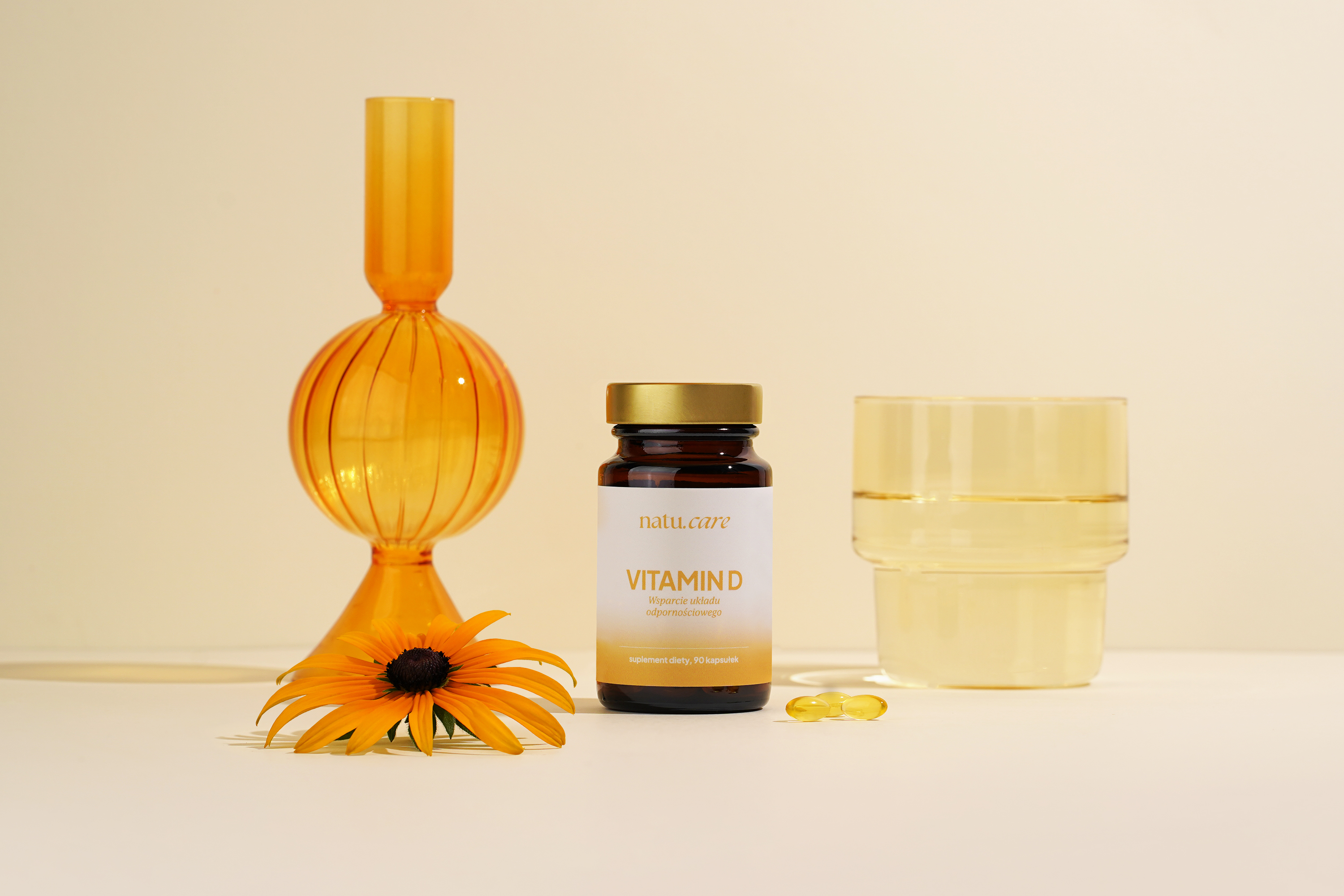
Zobacz, co dla Twojego zdrowia może zrobić Natu.Care Witamina D 2000 IU. -15% z kodem BLOG15
Natu.Care Witamina D 2000 IU
Natu.Care Witamina D 2000 IU wspiera prawidłowe działanie układu odpornościowego, utrzymanie zdrowych kości i zębów oraz utrzymanie prawidłowych funkcji serca, nerek i układu mięśniowego.
Sprawdź cenę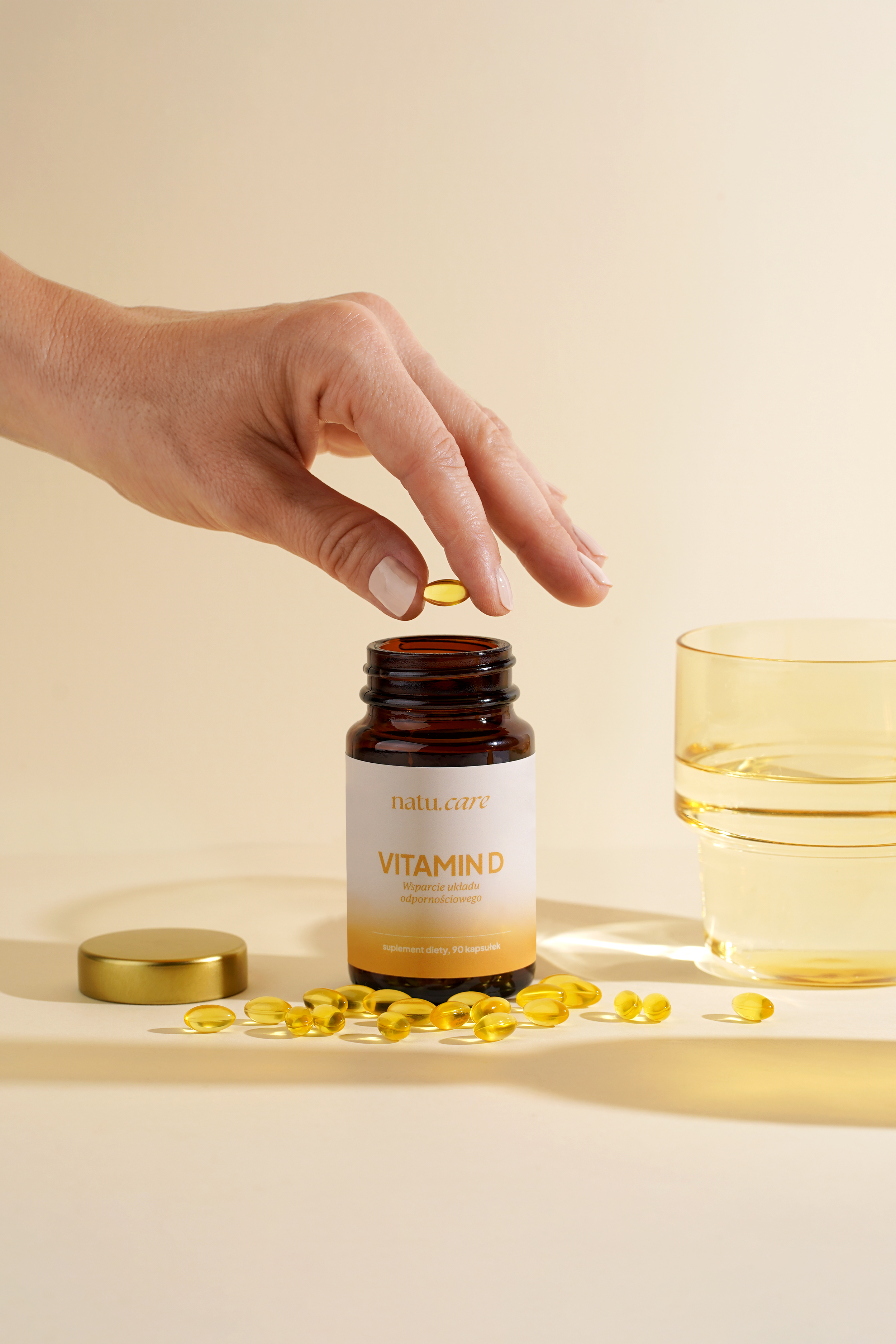
Świetny produkt, tabletki są małe i wygodne do połknięcia. Plus za wysoką jakość!Joanna
See also:
- Vitamin D3
- Vitamin D3 ranking
- Vitamin D3 drops
- Vitamin D deficiency
- Vitamin D overdose
- Maximum dose of vitamin D .
- Vitamin D .
- Vitamin D3 K2 whether you need to combine them + expert opinion
What is vitamin D in?
.
Vitamin D is found in foods such as oily sea fish, egg yolk, cheese, milk and mushrooms. The highest levels of vitamin D are found in fresh eel, salmon and herring - a 100g serving provides 800-1200 IU of this vitamin.
The sunshine vitamin can be found in .... the sun. Exposure of the skin to sunlight promotes its natural synthesis and is the natural and most effective source of vitamin D.
Sunshine is the most important source of vitamin D.
The three most important sources of vitamin D
.
Dermal synthesis
.
According to various sources, it is estimated that approximately 80-90% of the body's daily requirement for this vitamin is met by skin exposure to sunlight. In spring and summer, 15 minutes of sunbathing, between 10am and 3pm with arms and legs uncovered, yields as much as supplementation with 2000 IU of vitamin Dand.
Diet
.
We can obtain vitamin D from food. In this way we are able to cover the daily requirement in about 20%. Vitamin D intake in Poland is far from meeting the dietary recommendationsand.
See below to find out which products you can find vitamin D in.
.
Supplementation
.
Individual vitamin D supplementation depends on, among other things: season, lifestyle, age, diet, complexion. Before supplementation, it is advisable to do a blood test and check the concentration of vitamin D3 in the body. There are various vitamin D preparations available on the market. One form of administration is drops, which have a proven high bioavailability and better bioavailability than capsulesand.
Natu.Care Vitamin D 2000 UI
Product description
Vitamin D plays a crucial role in our health and well-being. It affects calcium and phosphate metabolism, which translates to healthy bones and teeth. It also helps regulate the immune system, and studies indicate its influence on the functioning of the nervous system.
Vitamin D, although called a “vitamin,” is actually a prohormone that our body produces on its own, primarily under the influence of sunlight. Unfortunately, our modern lifestyle contributes to deficiencies of this essential vitamin. Working in enclosed office buildings, using (necessary!) SPF creams, and covering the body with clothing all make it very difficult, if not impossible, to obtain adequate levels of vitamin D from sunlight. This is why appropriate, year-round supplementation is so crucial.
Vitamin D from Natu.Care is a well-tested vitamin D3 suspended in safflower oil, a plant known for its numerous health benefits. The convenient, easy-to-swallow capsule will make supplementation a part of your daily, healthy routine, improving your overall well-being.
Pros and cons
Pros:
- Ensures proper functioning of the immune system
- Supports the maintenance of healthy bones and teeth
- Maintains proper heart, kidney, and muscle function
- Tested by an independent, certified laboratory
- Convenient and easy-to-swallow capsule
- Clean composition - free from added sugar, gluten, GMOs, lactose, and without preservatives or colorants
Cons:
- None.
Additional Information
Pregnant women and breastfeeding mothers should consult a doctor before using the product. This dietary supplement is intended for a healthy adult population up to the age of 75.
OstroVit Vitamin D 4000 IU
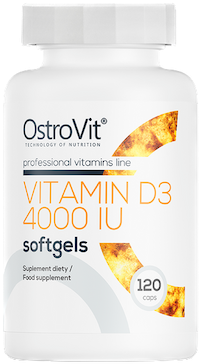
- Content vitamin D3: 4000 IU
- Form: capsules .
- Dose: 1 capsule per day .
- Sufficient for: 120 days .
Product description
OstroVit Vitamin D 4000 IU is a dietary supplement in the form of soft capsules, specially designed for peopleóing vitamin D deficiency, and especially recommended for seniorsów.
.Contains 4,000 IU of vitamin D per capsule, enabling effective dietary supplementation. The olive oil contained in the formula enhances the absorption of vitamin D, further enriching the supplement with healthy fats.
The supplement contains a wide range of vitamins and minerals.
The pack contains 120 capsules, allowing for four months of supplementation when taken with one capsule per day.
Pros and cons
OstroVit Vitamin D 4000 IU is a dietary supplement in the form of soft capsules, specially designed for peopleóing vitamin D deficiency, and especially recommended for seniorsów.
.Contains 4,000 IU of vitamin D per capsule, enabling effective dietary supplementation. The olive oil contained in the formula enhances the absorption of vitamin D, further enriching the supplement with healthy fats.
The supplement contains a wide range of vitamins and minerals.
The pack contains 120 capsules, allowing for four months of supplementation when taken with one capsule per day.
Additional information
OstroVit Vitamin D 4000 IU is a dietary supplement in the form of soft capsules, specially designed for peopleóing vitamin D deficiency, and especially recommended for seniorsów.
.Contains 4,000 IU of vitamin D per capsule, enabling effective dietary supplementation. The olive oil contained in the formula enhances the absorption of vitamin D, further enriching the supplement with healthy fats.
The supplement contains a wide range of vitamins and minerals.
The pack contains 120 capsules, allowing for four months of supplementation when taken with one capsule per day.
Dr. Jacob's Vitamin D3 drops
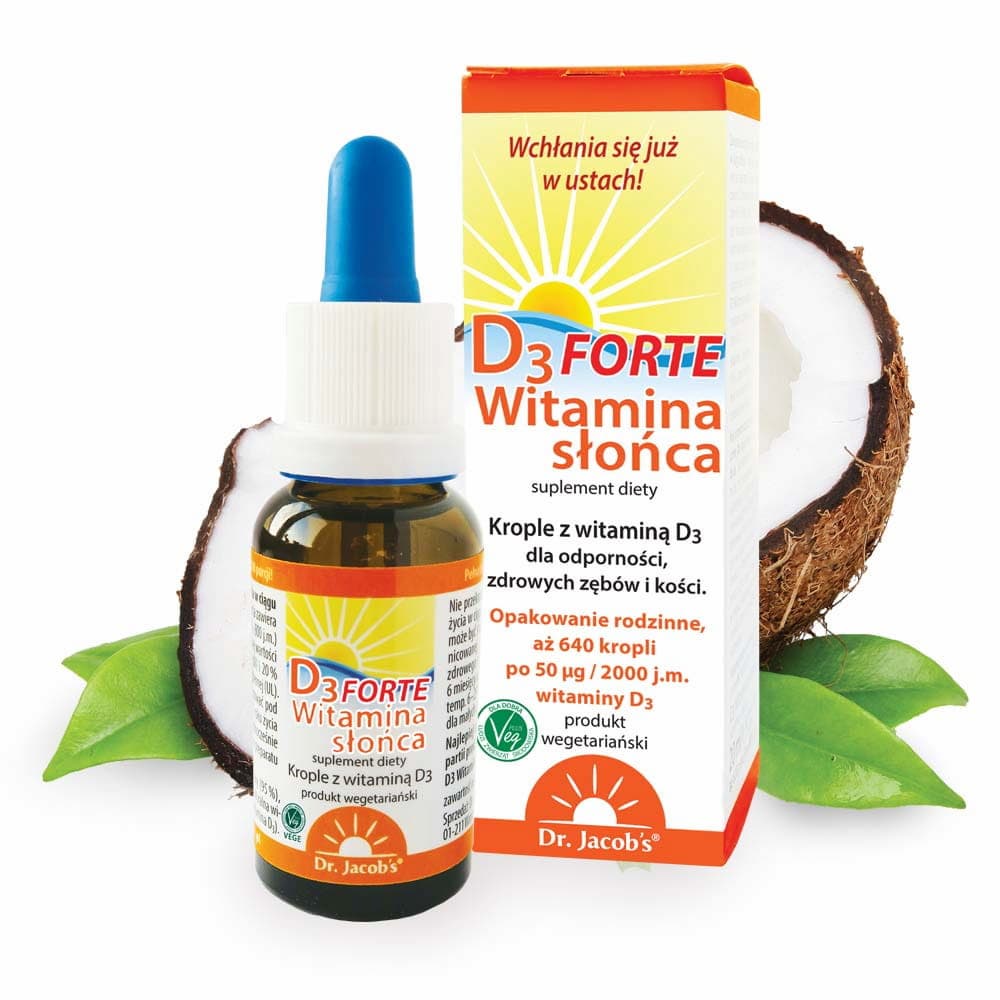
- Content vitamin D3: 800/1600 IU
- Form: drops .
- Dose: 1 or 2 drops daily .
- Sufficient for: 320–640 drops .
Product description
Sunshine Vitamin D3 FORTE is a dietary supplement containing a high dose of vitamin D3. Each drop of the product provides 800 IU of this essential vitamin for the proper functioning of the organism, whichóra supports the proper absorption of calcium and the maintenance of healthy bones, teethóra and muscles.
Pros and cons
Sunshine Vitamin D3 FORTE is a dietary supplement containing a high dose of vitamin D3. Each drop of the product provides 800 IU of this essential vitamin for the proper functioning of the organism, whichóra supports the proper absorption of calcium and the maintenance of healthy bones, teethóra and muscles.
Additional information
Sunshine Vitamin D3 FORTE is a dietary supplement containing a high dose of vitamin D3. Each drop of the product provides 800 IU of this essential vitamin for the proper functioning of the organism, whichóra supports the proper absorption of calcium and the maintenance of healthy bones, teethóra and muscles.
Vigantol witamina D3
Product description
Vigantol has been trusted by Poles for years. It is an over-the-counter medicine that you can buy at a good price at any pharmacy. It has a simple composition, without unnecessary additives and a small package that will fit into any home medicine cabinet.
Why is it worth it?
- The status of the medicine guarantees us the highest quality of the active ingredients, certainty about the dose and the effect of the preparation until the expiry date.
- Vigantol has an advantage over other over-the-counter vitamin D3 medicines because of the form of the drops.
- The drops are better absorbed by the body and do not need to be taken with a meal (unlike, for example, Vigantoletten, which is in tablet form and is recommended to be taken with a fatty meal).
Take note
- The bottle does not have a convenient dispenser. To measure the four recommended daily drops, turn the bottle upside down. The drops dispense slowly. When the liquid runs out, it is difficult to empty the bottle "dry" - a little is left inside.
- If the dispenser becomes clogged, gently tap the bottom of the bottle against the surface (tabletop, table) and then dispense the drops.
- You can use Vigantol for children, bearing in mind that 1 drop is 500 IU, and this is the requirement from the age of 3.
D-vitum
Product description
Oleofarm D-Vitum Forte Max 4000 IU is a dietary supplement in the form of capsules with high vitamin D content. The preparation is designed to supplement the diet of healthy adults over 75 years of age with this valuable active ingredient.
Pros and cons
Oleofarm D-Vitum Forte Max 4000 IU is a dietary supplement in the form of capsules with high vitamin D content. The preparation is designed to supplement the diet of healthy adults over 75 years of age with this valuable active ingredient.
Additional information
Oleofarm D-Vitum Forte Max 4000 IU is a dietary supplement in the form of capsules with high vitamin D content. The preparation is designed to supplement the diet of healthy adults over 75 years of age with this valuable active ingredient.
Expert opinion
OstroVit Vitamin D3 4000 + K2
Product description
A dietary supplement in tablets supplementing the diet with vitamin D and K. Vitamin D helps in the proper absorption and utilisation of calcium and phosphorus, and in maintaining a normal level of calcium in the blood. Vitamin K contributes to normal blood clotting and helps maintain healthy bones.
Pros and cons
A dietary supplement in tablets supplementing the diet with vitamin D and K. Vitamin D helps in the proper absorption and utilisation of calcium and phosphorus, and in maintaining a normal level of calcium in the blood. Vitamin K contributes to normal blood clotting and helps maintain healthy bones.
Additional information
A dietary supplement in tablets supplementing the diet with vitamin D and K. Vitamin D helps in the proper absorption and utilisation of calcium and phosphorus, and in maintaining a normal level of calcium in the blood. Vitamin K contributes to normal blood clotting and helps maintain healthy bones.
Expert opinion
{ product:3KOyJcpaAPk2YwN4VI42ih }}
What is vitamin D in? Dietary sources [table]
.
Sources of vitamin D from food include, for example: full-fat fish, egg yolk, milk and dairy products, mushrooms, and products fortified with vitamin D e.g. breakfast cereals, vegetable drinks.
What products contain the most vitamin D?
.
Check the table below and see if you have these products in your diet. Or maybe it's a good time to diversify your menu?
Full-fat fish
.
A natural source of vitamin D is full-fat fish. Choose fish from a reliable source. The best fish are caught in the Atlantic, Pacific and North Sea.
Content of vitamin D in fishand:
. .
|
Name . |
Vitamin D content (40 IU = 1 µg) . |
|
|
Fresh carbon . |
1200 IU/100 g |
|
|
fresh wild salmon |
600-1000 IU/100 g . |
|
|
shrimp in oil |
||
| . |
808 IU/100 g |
|
|
Marinated herring |
480 IU/100 g |
|
|
beef (cooked/roasted) . |
540 IU/100 g
. |
|
|
fresh farmed salmon |
||
|
100-250 IU/100 g . |
||
|
canned fish (e.g. tuna, sardines) . |
200 IU/100 g . |
|
|
mackerel (cooked/baked) |
||
| . | .
152 IU/100 g . |
|
|
fresh cod |
40 IU/100 g |
Egg yolk, milk, cheese and mushrooms
.
Vitamin D is found to a lesser extent in egg yolks, milk and dairy products and cheese. However, it is worth including these products in your diet.
Content of vitamin D in selected foodsand
.
|
Name . |
Vitamin D content (40 IU = 1 µg) . |
|
Egg yolk |
54 IU/egg yolk |
|
cow's milk . |
0.4-1.2 IU/100 ml . |
|
cheddar |
24 IU/100 g |
|
parmesan |
21 IU/100 g |
|
camembert |
18 IU/100 g |
|
mozzarella . |
16 IU/100 g . |
|
shiitake mushrooms |
100 IU/100 IU |
.
Other foods fortified with vitamin D
.
Today, there are a plethora of vitamin D-enriched products on the market. In addition to foods for infants and children, we can also buy plant-based drinks or breakfast cereals.
Vitamin D content of selected foodsand
.
|
Name . |
Vitamin D content (40 IU = 1 µg) . |
|
|
modified infant milk .(0-6 months of age) . |
40-60 IU/100 ml . |
|
|
modified follow-on milk .(7-12 months of age) . |
56-76 IU/100 ml . |
|
|
modified milk junior (2-3 years of age) . |
70-80 IU/100 ml . |
|
|
Breakfast cereals fortified with vitamin D |
Depending on manufacturer 8-100 IU/portion . |
|
|
milk milk-rice porridges, milk-cereal porridges |
Depending on manufacturer 160-480 IU/100 g . |
|
| . |
plant-based beverages |
depending on manufacturer approx. 50-100 IU/portion |
Did you know that in Poland there is an obligation to enrich bread spreads (except butter) with vitamin D? This makes them an additional source of it in the diet.
Is vitamin D found in fruit and vegetables?
.
Unfortunately, vitamin D is not found in fruit and vegetables. Are you surprised? However, remember that they should be on your plate every day! They are bombs of other vitamins and minerals that have a huge impact on your health and wellbeing.
Have you heard of the combination of vitamins D3 K2 MK7? Don't be fooled - read the article co-written with an expert on why you shouldn't buy such a combination!
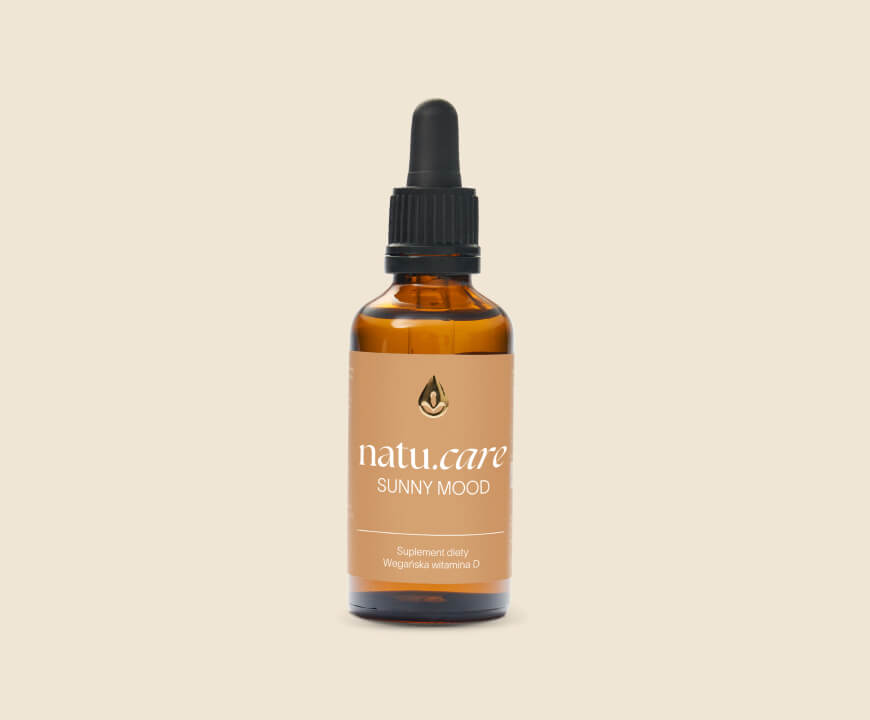
Vegan vitamin D3 from seaweed in drop form
.Sunny Mood is a vegan vitamin D3 from seaweed in drop form. Simple formulation, high bioavailability and convenient administration.
Diet with vitamin D - recipes from the expert
.
It is impossible to cover the daily requirement of vitamin D from the diet. However, it is worth composing your meals so that they are rich in nutrients. A varied diet rich in healthy fats will make it easier for us to absorb vitamin D. Below are some suggestions for balanced meals from nutritionist Aleksandra Cudna.
.
Breakfast
.
Salmon, egg and avocado sandwiches
.
Ingredients:
.
- .
- hen's egg 55 g (1 piece), .
- avocado 70 g, .
- wholemeal rye bread 70 g (2 slices), .
- smoked salmon 50 g, .
- Lemon juice, pepper, salt to taste, .
Making: Hard boil the egg. Crush avocado with a fork, season. Spread avocado on bread, place salmon and sliced egg on top. Alternatively, you can blend all the ingredients to make a paste and spread it on the bread.
.
In this meal you will find 1.70 µg (68 IU) of vitamin D and healthy omega-3 acids.
See also:
.
- Omega acids [types + properties + deficiency] .
- DHA acid [what it is + health properties + sources] .
- Omega-3 in tablets [ranking] .
Dinner
.
Baked cod with spinach and potatoes
.
Ingredients:
.
- .
- fresh cod 150 g, .
- fresh spinach 50 g (2 handfuls), .
- potatoes 250 g (2 large pieces), .
- parmesan cheese 20 g (2 tbsp), .
- olive oil 10 g (1 tbsp), .
- Salt, pepper to taste, .
Making: Season the cod as desired and brush with olive oil. Place in a preheated 200°C oven for 15-20 minutes. Cook the potatoes until soft. When the cod is ready, sprinkle with Parmesan cheese, place on a plate together with the potatoes, top with spinach and season as desired.
In this meal you'll find 1.55 µg (62 IU) of vitamin D, healthy omega-3 fatty acids and vitamins K and C.
Dinner
.
Omlet with camembert cheese and chanterelles
.
Ingredients:
.
- .
- hen's eggs 110 g (2 pieces), .
- flour (e.g. rye, wheat, spelt) 20 g (2 tbsp), .
- currants 80 g (1 large handful), .
- cow's milk/vegetable drink 30 g (3 tbsp), .
- camembert cheese 20 g (2 slices), .
- garlic 5 g (1 clove), .
- olive oil 5 g (1 teaspoon), .
- Salt, pepper, thyme to taste, .
Execution: Heat the olive oil in a frying pan. Add the sliced chanterelles and fry until browned (about 5 minutes). Scramble the eggs, add the milk/vegetable drink, pressed garlic, flour and mix. Pour the mixture over the chanterelles and fry covered for approx. 1 minute, then turn on the other side. Place the omelette on a plate, top with 2 slices of camembert, season as desired and fold the omelette in half.
.
In this meal you will find 6.03 µg (241 IU) of vitamin D and, among other things, B vitamins and vitamin A.
Sounds tasty? Get inspired, modify to your liking, and cook someone a delicious surprise, rich in vitamins and healthy fats. After such a meal you will ensure better absorption of vitamin D.
.
See also:
- Vitamin K2 [properties + occurrence + contraindications] .
- Vitamin K [occurrence + effects + deficiency symptoms] .
- Omega acids [types + properties + deficiency] .
- Omega-3 fatty acids [characteristics + use + types] .
- DHA acid [what it is + health properties + sources] .
- Tran: what it is, types, properties, effects and dosage
- Thyroid tests [which ones to do + standards + results] .
- Blood tests [how often to perform + how to prepare]
- Cortisol testing [norms + low or too high levels + price]
I've shown you where vitamin D is, use that knowledge! Go for a walk, let the sunshine bathe you, diversify your diet and get a good vitamin D supplement.
Did you know that you can't find vitamin D in fruit and vegetables? Is there anything else you were curious about? Let me know in the comments. You can also write about how to turn a chanterelle omelette right side up - I'm looking for tips!
Summary
- The three sources of vitamin D acquisition are: skin synthesis, diet, supplementation.
- As much as 80-90% of the daily vitamin D requirement is covered by sun exposure and about 20% by a balanced diet.
- Vitamin D supplementation is particularly important during autumn and winter and when skin synthesis is insufficient - then recommended throughout the year.
FAQ
.What are the best sources of vitamin D?
.The best natural source of vitamin D is sun exposure. It is synthesised in the skin when exposed to UVB radiation. You can also take vitamin D in foods such as:
- fatty fish - e.g. salmon, mackerel, tuna and sardines, .
- eggs (yolk), .
- beef liver, .
- milk, yoghurt and cheeses enriched with vitamin D, .
- spinach and other leafy vegetables, .
Vitamin D supplementation is also recommended - especially between autumn and summer. Do it responsibly, so first check out our ranking of the best vitamin D products.
What fruit is vitamin D in?"
.Vitamin D is not found in fruit in significant amounts because most fruits contain very low amounts of fat, which is needed for vitamin D production in the body. Some fruits contain small amounts of vitamin D2 (ergocalciferol), which are produced by plants as a result of exposure to sunlight.
However, these are not sufficient to cover the daily requirement - check what the maximum vitamin D intake is.
What vegetables contain vitamin D?
.Fat and sun exposure are needed to produce vitamin D. For this reason, few vegetables are sources of it. Small amounts of vitamin D are found in spinach, for example.
.Not a good source of vitamin D, however, are mushrooms, in particular shitake, mushrooms and portobello (approx. 100 IU/100 g).
How much vitamin D does an egg have?
.The main source of vitamin D in an egg is the yolk - the white has none. It has about 54 IU, which is 5-10% of the daily requirement for adults. The amount of vitamin D in an egg can vary depending on the hen's diet, rearing method and sun exposure. Eggs from free-range hens have more vitamin D than from caged hens.
What are the symptoms of vitamin D deficiency?
.Vitamin D deficiency produces a myriad of symptoms. Here are some of the most important ones:
- weakening of muscles, .
- decreased physical endurance, .
- hair loss, .
- decreased immunity, .
- overweight, .
- bone diseases, .
- skin problems, .
- mood swings, .
The symptoms of vitamin D deficiency are varied and uncharacteristic, and their severity can vary depending on the severity of the deficiency.
Want to know more? See also: Symptoms of vitamin D deficiency + treatment options and doctor's opinion.
Does vitamin D deficiency cause depression?
.There is a link between vitamin D deficiency and depression, but the relationship is complex and not yet fully understood.
Vitamin D regulates levels of neurotransmitters, such as serotonin, which affect mood and brain function.
Research suggests that people with vitamin D deficiency have a higher risk of depression and other mood disorders, such as anxiety and irritability. It is still unclear whether vitamin D deficiency directly causes depression, or whether it is the result of a superimposition of other factors as well.
The following is not yet known.
Do you notice symptoms of depression or low mood? Ask a psychologist or psychiatrist for help.
Does lack of vitamin D cause weight gain?
.According to some studies, people with vitamin D deficiency are more likely to be overweight and obese, although this link is not fully explained.
One possible reason is that vitamin D deficiency may affect the endocrine system - including the production of hormones that regulate appetite and metabolism. Vitamin D deficiency can also affect insulin sensitivity, which can lead to increased glycaemia and hinder weight loss.
Research is still ongoing, but you need to remember that weight gain can have many causes - including poor diet, physical inactivity, stress, co-morbidities or thyroid problems.
How much does a blood test for all vitamin levels cost?
Prices for blood tests for all vitamin levels may vary depending on the package you choose or the laboratory itself. You can choose between basic and extended packages. Some laboratories also offer comprehensive vitamin and mineral testing, in which - in addition to vitamin D - you will have your concentrations determined for, among others:
- vitamin B12 and other B vitamins,
- folic acid (vitamin B9), .
- zinc, .
- iron, .
- magnesium, .
- phosphorus, .
- calcium, .
Basic package prices start from £150.
.
How to supplement vitamin D?
.You can supplement vitamin D deficiencies in four ways:
.- exposure to the sun - the more time you spend outdoors, the better; .
- diet - include fatty fish, liver, egg yolks, cheeses, milk and dairy products enriched in vitamin D in your menu; .
- supplementation - start this after consultation with a specialist and choose the best vitamin D supplements;
- phototherapy - you can only start light treatment under the care of a doctor; .
.
Resources
.See all
.Chauhan, K., Shahrokhi, M., & Huecker, M. R. (2022). Vitamin D. In StatPearls. StatPearls Publishing. http://www.ncbi.nlm.nih.gov/books/NBK441912/
Jarosz, Prof. Dr. n med M. (2020, December 3). Nutrition Standards 2020. National Center for Nutrition Education. https://ncez.pzh.gov.pl/abc-zywienia/normy-zywienia-2020/
St, H., & Sk, P. (2012). Vitamin D supplementation: What's known, what to do, and what's needed. Pharmacotherapy, 32(4). https://doi.org/10.1002/phar.1037
.
Editorials
Meet the team


Editor
Graduate of Journalism and Artes Liberales at the University of Warsaw. Since 2017, he has been working with the biggest portals in Poland and abroad as an editor. Previously worked for 3 years in one of the leading pharmaceutical companies - he knows the health and beauty industry inside out. In his free time, he most enjoys playing tennis or skiing.
![Vitamin B12 - where it occurs in the diet and in products [table].](https://cdn-resources.natu.care/uploads/1/balanced_diet_nutrition_healthy_eating_concept_food_sources_rich_vitamin_b12_cobalamin_kitchen_table_1_b84f75bda2.jpg)
Find out where vitamin B12 is found and which products will provide you with it.

Vitamin PP also known as niacin or vitamin B3 supports the proper functioning of the body.
![What is NMN? Effects, effects, side effects [supplements].](https://cdn-resources.natu.care/uploads/1/science_background_with_molecule_atom_abstract_structure_science_medical_background_3d_illustration_1_a5ec4d9cec.jpg)
Everything you want to know about NMN: properties, effects, safety and expert opinions.
